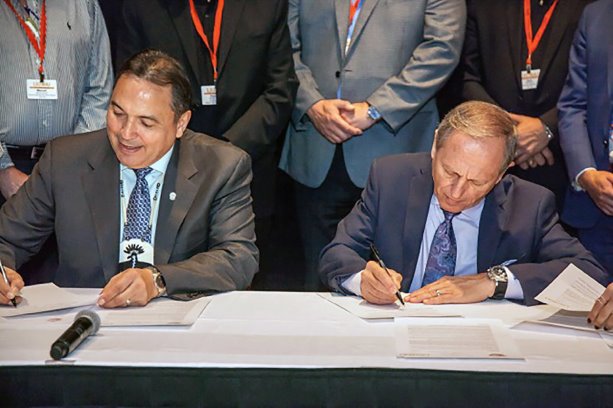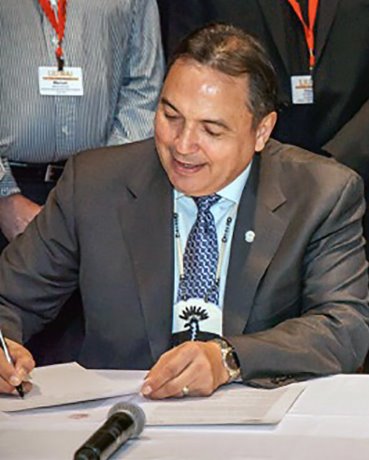Labourers’ International Union of North America (LIUNA) international vice-president Joe Mancinelli and National Chief Perry Bellegarde of the Assembly of First Nations (AFN) met in Vancouver June 6 to sign a pact affirming LIUNA’s commitment to First Nations rights and rebooting the union’s extensive package of training supports.
Mancinelli said the continuing partnership recognizes LIUNA’s political, social and economic alignment with Canada’s indigenous peoples and provides a formal framework for the continuation of training programs that were launched when LIUNA and then AFN National Chief Phil Fontaine signed a similar agreement in 2007 that Mancinelli explained was not open-ended and had expired.
The agreement signed last week in front of some 300 LIUNA executives, supporters and First Nations leaders at the Fairmont Hotel in Vancouver includes formal LIUNA support for the findings of the Truth and Reconciliation Commission and the UN Declaration for Indigenous People.
"LIUNA represents over 110,000 members from coast to coast to coast and is the embodiment of strength, honour and justice as we collectively remember the struggle of those who paved the way before us," said Mancinelli in a statement.
"The century-old struggles of the indigenous communities across Canada have for hundreds of years sought to be treated as equal and LIUNA strongly believes that together we can build a strong partnership with an emphasis on training and education, as youth are the future builders of our growing economy."
Mancinelli said in an interview that besides the social and cultural support LIUNA extended to the AFN through the agreement, the deal confirms the "very strong synergies between the indigenous community and us" and, with no expiration date, the agreement ensures the continuation of LIUNA training programs long term.
The LIUNA executive said the union can now continue "to train a number of young indigenous people in the industry, and of course we need them, a lot of folks are retiring, there is a shortage of skilled labour of course, we have a demand for these folks, so it is good for us and good for them because they are desperate to get their youth into meaningful employment. So the construction industry can provide that."
LIUNA’s support for Canada’s First Nations is heartfelt, Mancinelli said.
"We are heartbroken quite frankly, the history we have, and this being the 150th celebration of Canada, it pains me to look at our history in the last 150 years and what we’ve done to the indigenous people of Canada, whether it’s the residential homes or the murdered women, it breaks my heart," he said. "It is one of the worst blemishes this country has."
The training and support programs LIUNA has put together enables the union "to put our money where our mouth is," said Mancinelli.
Besides LIUNA training centres in every province in Canada that often provide services to indigenous youth, including 12 campuses in Ontario alone, the union has targeted indigenous training programs based in Toronto, Hamilton, Sarnia and Thunder Bay. LIUNA also has mobile units that take its trainers deep into the Canadian North and other remote locations to teach skills nearer to First Nations territories.
Mancinelli and Fontaine are now co-chairs of LIUNA’s national indigenous committee, and the union has hired long-time Saskatchewan-born construction worker and LIUNA organizer Larry Villeneuve, who’s of Metis heritage, to serve as its national director of indigenous affairs.
Continuing roundtable discussions involving chiefs and councils, stakeholder groups such as Enbridge, LIUNA program co-ordinators and contractors have been a "huge success," Villeneuve noted.
He and Mancinelli talked about the importance of imparting "transferrable" skills, meaning skills that can be applied to other jobs when one project is done, to other non-construction work and life situations, to other community members when workers return to their homes and as trainers through LIUNA’s Train the Trainer program.
"The success comes as a result of the training to recruitment to the jobs," said Villeneuve. "With LIUNA, with the many different sectors that we train in, the beauty is that they are all transferrable. So we are not just training in pipelines, we are training in industrial work, we are dealing with commercial sector work, civil, roadbuilding and so on. So whatever fits the territory or community that we are close by."
Added Villeneuve, "The beauty has been watching individual young men and women who are now supervisors, superintendents, who are getting unbelievable recognition for their work on pipelines."

Labourers’ International Union of North America international vice-president Joe Mancinelli (right) and National Chief Perry Bellegarde of the Assembly of First Nations signed a Statement of Partnership in Vancouver June 6.
Photo: LIUNA"










Recent Comments
comments for this post are closed